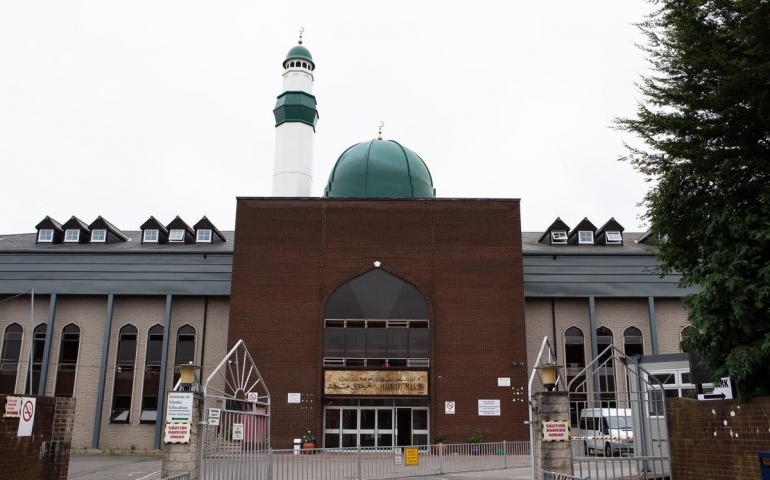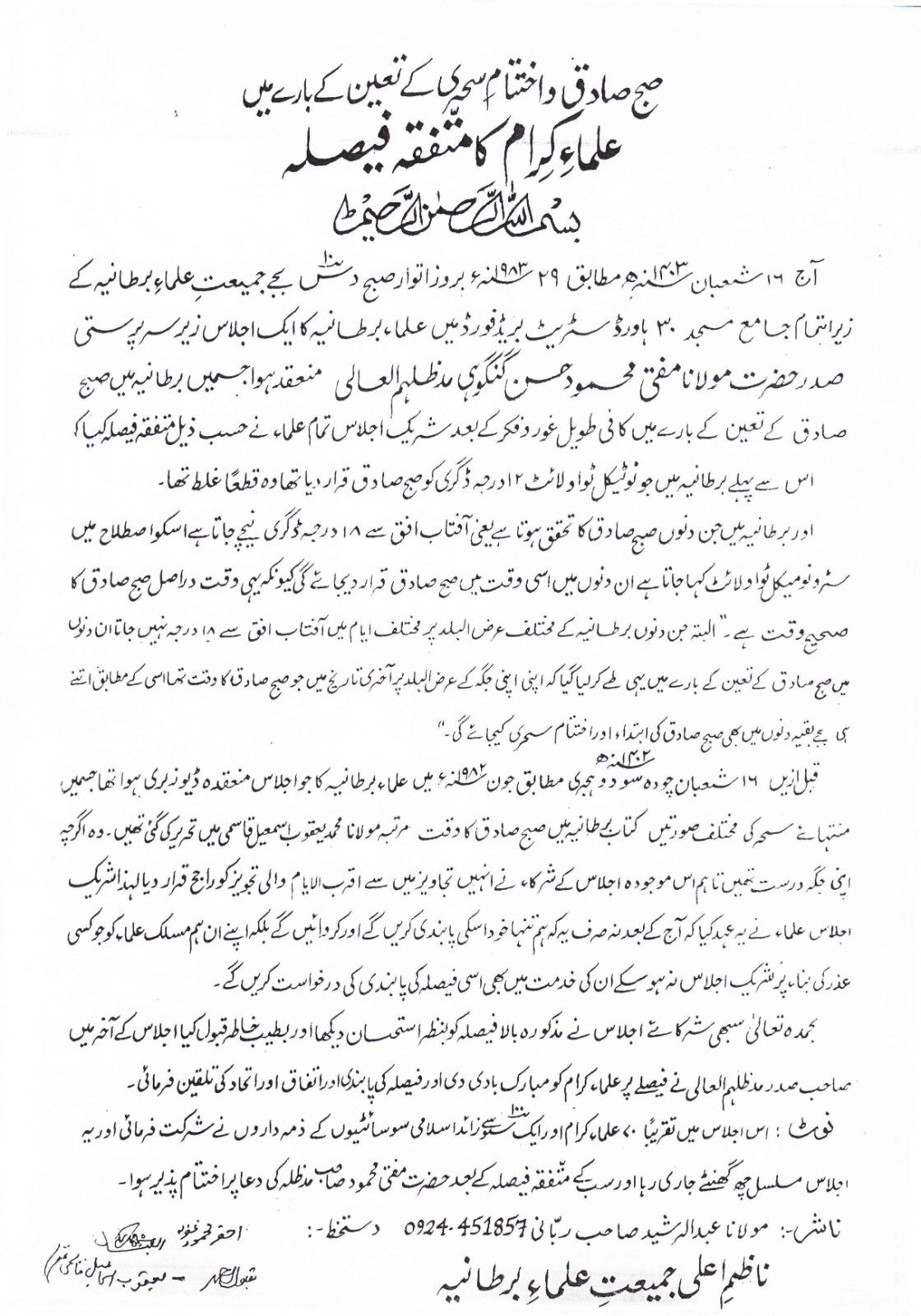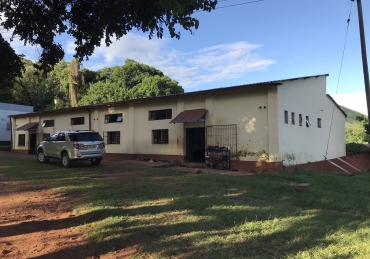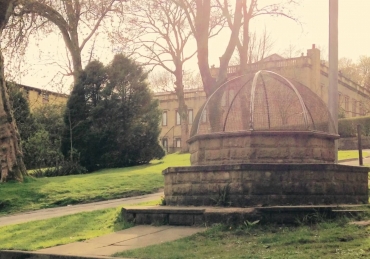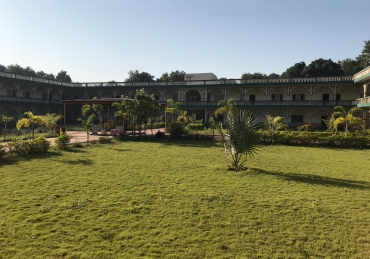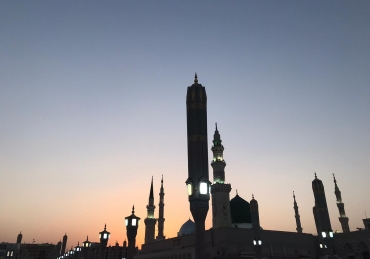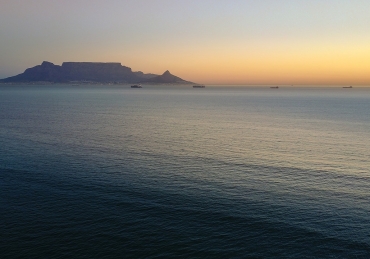Obituary: Ḥaḍrat Mawlānā Yaʿqūb Munshī Kāwī Qāsmī (1350/1931 – 1444/2022)
In the Name of Allah, the Merciful, the Beneficent
Yesterday evening in Birmingham, I received the sad news of the demise of one of the UK’s most learned scholars, Ḥaḍrat Mawlānā Yaʿqūb Qāsmī of Dewsbury. He was from among the few remaining students of Shaykh al-Islam Mawlānā Ḥusayn Aḥmad Madanī (d. 1377/1957) worldwide and the final student in the UK. He was an all-rounded person: an orator who pioneered the work of Daʿwah, a jurist who established the first Shariah Council in the UK and uncovered a national error in Ṣalāh times, an author who wrote several books and a teacher and mentor for many. His demise is undoubtedly a great loss for the Ummah and particularly for the Muslims of the UK.
Mawlānā Yaʿqūb ibn Ismāʿīl ibn ʿĪsā ibn Walī Raḥimahullāh was born on Monday 14 Muḥarram 1350 (1 June 1931) in the Indian village of Kāwī, Bharuch, Gujarat. He acquired his early religious and secular education in his village and thereafter enrolled at the famous Ashrafia Darul Uloom in Rander. Thereafter, he travelled to Deoband and graduated in 1372 (1953). Here, he had the fortune of studying Ṣaḥīḥ al-Bukhārī and Sunan al-Tirmidhī with Shaykh al-Islam Mawlānā Ḥusayn Aḥmad Madanī, Ṣaḥīḥ Muslim with ʿAllāmah Ibrāhīm Balyāwī (d. 1387/1967), Sunan Abī Dāwūd by Mawlānā Iʿzāz ʿAlī Amrowhī (d. 1374/1954), Sunan Nasāʾī by Mawlānā Fakhr al-Ḥasan (d. 1393/1973) and Sunan Ibn Mājah by Mawlānā Ẓuhūr Aḥmad Deobandī. Some of his contemporaries included the great Muḥaddīth, Shaykh Muṣṭafā Aʿẓamī (d. 1439/2017).
After graduation, he returned to Gujarat and became Imam and taught Maktab in Bhadkodra for the next ten years. My dear friend, Mawlānā Amjad ibn Mufti Aḥmad Dewlā narrates that whilst in Bhadkodra, he memorised the Qurān in 6-8 months during his spare time, and thereafter also led Tarāwīḥ Ṣalāh.
Mawlānā was subsequently appointed to teach at the famous Darul Uloom in Dabhel where he taught for two years. His students of this period include Mufti Aḥmad Dewlā (b. 1365/1945), the Principal of the Darul Uloom in Jambusar.
At the end of the second year of teaching in Dabhel, Mawlānā went out in Tablīg Jamāʿat and returned some eleven months later. He left his teaching position and got heavily involved with the effort of Tablīg and started to tour various parts of India. He had a close relationship with the second Head of Tablīgh, Mawlānā Yūsuf Kāndhelwī (d. 1384/1965) who advised him to travel to different parts of the Arab world for Tablīg. Mawlānā Yaʿqūb Ṣāḥib was fluent in Arabic and was widely read. He thus travelled to many Arab countries including Syria, Saudi Arabia, Egypt, Lebanon, Jordan, Libya and Morocco. Mawlānā Yūsuf Ṣāḥib’s confidence in him was such that he requested him to check the famous Ḥayāt al-Ṣaḥābah before publication.
Subsequently, Mawlānā migrated to the UK in January 1966 (1378) and was from among the first Muslims who settled in Dewsbury. At the time, there were approximately 50 Muslim households in the town. My maternal grandfather Ḥājī Adam Patel (d. 1429/2008) had arrived prior to this in 1962. Mawlānā Amjad provides some background to Mawlānā’s migration to the UK,
“In 1964, Ḥāfiẓ Patel Ṣāḥib Raimahullāh travelled for Hajj. Mawlānā Yūsuf Kāndhelwī Raḥimahullāḥ was also in Hajj that year and Mawlānā Yaʿqūb Shaykh Dewlā (the father-in-law of Mawlānā Ismāʿīl Ṣāḥib, Preston) was also part of that convoy. He was Mawlānā Yaʿqūb Qāsmī’s classmate in Rander. During Ṭawāf, Ḥāfiẓ Patel Ṣāḥib requested Mawlānā Yaʿqūb Shaykh Dewlā to migrate to the UK and join him in the effort of Tablīg. Mawlānā Yaʿqūb Shaykh Dewlā suggested to Ḥāfiẓ Patel Ṣāḥib to consider Mawlānā Yaʿqūb Qāsmī Ṣāḥib and propose him to Mawlānā Yūsuf Kāndhelwī Ṣāḥib. Mawlānā Yūsuf Ṣāḥib concurred. However, within a short period, Mawlānā Yūsuf Ṣāḥib passed away. Mawlānā Yaʿqūb Ṣāḥib was hesitant to migrate to the UK. However, Mawlānā Inʿām al-Ḥasan Ṣāḥib insisted and he eventually agreed. He was the first graduate of Darul Uloom Deoband to be appointed as Imam in the UK.”
Upon his arrival to the UK, Mawlānā was actively involved in the effort of Tablīg. My respected father Mufti Shabbīr Aḥmad (b. 1376/1957) who enjoined a very close relationship with him since the 1980s recalls,
“Ḥaḍrat Mawlānā Yaʿqūb Ṣāḥib was the right-hand person of Ḥāfiẓ Patel Ṣāḥib and his backbone, similar to how Mawlānā ʿUmar Pālanpūrī was for Mawlānā Inʿāmul Ḥasan Ṣāḥib. Mawlānā Yaʿqūb Ṣāḥib was the one who would do the speeches in every Tablīg Ijtimāʿ. He was the intellectual powerhouse. I knew him since 1969. His speeches were solid. I was only 12-13 at the time but I still recall what he said in some of those speeches. Allah had blessed him with eloquence in speech and profound knowledge. He would deliver Arabic speeches with such fluency that I have not come across anyone so fluent from our circles. It was unfortunate that due to Ḥasad (jealousy) of some people, he took a step back from the work. One of the qualities of Mawlānā was that he would not bear any grudge or ill feelings against those who he disagreed with. He would meet them with respect. This was his sincerity. I would visit him regularly and he was always very affectionate towards me and would talk to me candidly. Most recently, I visited him a few weeks ago on Monday 25 July 2022 with Mufti Raḍāul Ḥaq Ṣāḥib [b. 1369/1950] of South Africa.”
It must be noted here that Mawlānā’s efforts were not confined to speeches. He was instrumental in the establishment of Dewsbury Markaz. I suffice with one example here. Mawlānā successfully managed to acquire a donation of £54,000 from the Libyan Government for the Markaz. It was then in 1983 that Mawlānā presented the accounts to the Shūrā, handed over the keys and stopped his involvement in the Markaz. For a short period thereafter, he continued the taʿlīm of Ḥayāt al-Ṣaḥābah until that also stopped. Mawlānā also played an active role in the fundraising efforts for Zakaria Masjid Dewsbury.
Mawlānā Yaʿqūb Ṣāḥib is known for the Ṣubḥ Ṣādiq (dawn) issue. The background to this is that in 1980, he travelled to North America for four months Tablīg. During his stay at the Chicago Muslim Community Centre, he came across a fifteen-minute difference for Ṣubḥ Ṣādiq in some of the timetables. During this visit, he became acquainted with Dr Kamal Abdali, who had compiled a book on Ṣalāh times for North America. Mawlānā requested Dr Kamal Abdali to provide him with a Ṣalāh timetable for Manchester. It was then that he realised the issue of perpetual twilight during the summer months. This acted as the springboard for Mawlānā to investigate Ṣalāh times in the UK. During his research, Mawlānā also came across the discussion among the scholars of Pakistan on whether Ṣubḥ Ṣādiq occurs when the sun reaches 18 or 15 degrees below the horizon. This issue is discussed in detail in Mawlānā’s book as well as Aḥsan al-Fatāwā and other Fatwā works.
When Mawlānā returned to the UK, he started to make enquiries about the Ṣalāh timetables in the UK. He discovered that the timetables in the UK are erroneous, because the Ṣubḥ Ṣādiq time is neither at 18 or 15 degrees, rather it is much below at 12 degrees nautical twilight and in some months below this. This was first discovered by Mawlānā, who then brought it to the attention of scholars across the country. The research also discovered that there are some days in the UK in the summer months when the sun does not reach 15 or 18 degrees; it starts the ascent back even before reaching this, hence the sky does not go pitch black in the summer months. Thus, ʿIshāʾ Ṣalāh time does not occur, contrary to what the Ṣalāh timetables assumed.
The many discussions and meetings on the issue eventually led to the historic six-hour meeting of Jamiat Ulama UK on 16 Shaʿbān 1403 (29 May 1983) in Bradford in the presence of the grand Mufti of India, Mufti Maḥmūd Ḥasan Gangohī (d. 1417/1996). The meeting was attended by 70 scholars and representatives of 100 Masjids and organisations. It concluded that Ṣubḥ Ṣādiq occurs at 18 degrees, and in the days that the sun does not reach 18 degrees, the preferred option from the several options is Aqrab al-Ayyām. The one-page document that was released after this meeting by the convenor of Jamiat, Mawlānā ʿAbd al-Rashīd Rabbānī was signed by four scholars: Mufti Maḥmūd Ḥasan Gangohī, my respected father Mufti Shabbīr Aḥmad, Mufti Maqbūl Ṣāḥib of Glasgow and finally Mawlānā Yaʿqūb Ṣāḥib.
It should be noted that at this stage in 1983, consensus was reached upon 18 degrees. It is very unfortunate that several years later, this consensus was broken based on some observations.
This is described with some detail because it was Mawlānā Yaʿqūb Qāsmī Ṣāḥib’s efforts that led to the discovery of the initial error. If this was the only accomplishment of Mawlānā in his life, I believe this would have sufficed for his salvation, and Allah knows best. We are all indebted to Mawlānā for this.
Another issue Mawlānā is famous for is the moonsighting issue. Historically, Muslims in the UK were following Morocco. In 1986, a meeting of Jamiat Ulama and the newly formed Hizbul Ulama convened at Darul Uloom Bury and it was decided by the majority of attendees to switch to Saudi Arabia. Mawlanā Yaʿqūb Ṣāḥib disagreed with this and was firmly of the view that the delayed arrival of the fax to Munshī Ṣāḥib’s house in Chorley was no justification for the switch. It is worth noting that the elders of Tablīg including Mawlānā Inʿām al-Ḥasan Ṣāḥib (d. 1416/1995) and Mawlānā ʿUmar Pālanpūrī (d. 1418/1997) were not satisfied with the Saudi moonsighting.
Mawlānā Yaʿqub Qāsmī Ṣāḥib was a man of principle. He would speak what he saw as the truth. Nothing would deter him. He was not interested in position or status. For him, there was a higher purpose, and that was to please Allah Almighty. Piety and Taqwā were his hallmarks. If he had ‘toed the line’, he would have undoubtedly been the Shaykh al-Ḥadīth in Dewsbury Markaz and probably also Amīr of Tablīg after Ḥāfiẓ Patel Ṣāḥib (d. 1437/2016).
After his separation from Dewsbury Markaz, Mawlānā continued his mission. He authored several books and was a regular attendee at the Indian Fiqh Academy and other international Fiqh seminars. He enjoyed a close relationship with many of the leading scholars of the world including Mawlānā Muḥammad Yūsuf Binorī (d. 1397/1977), Shaykh Abū al-Ḥasan ʿAlī Nadwī (d. 1420/1999) and Qāḍī Mujāhid al-Islām Qāsmī (d. 1423/2002). The two scholars who he benefited from the most were Shaykh Abū al-Ḥasan ʿAlī Nadwī and Shaykh al-Islām Mawlānā Ḥusayn Aḥmad Madanī. Once he said to Shaykh Abū al-Ḥasan ʿAlī Nadwī that he struggles to understand his books. Shaykh advised him to read the first line of the book, then read it again and that he will understand after reading several times. Thereafter, he became deeply attached with his writings.
Mawlānā’s profound knowledge can be gauged from his works on Ṣalāh times, moonsighting and other topics. Along with being an orator, he was an excellent writer. Some of his works are relied upon by scholars in many countries. His publications include:
- Barṭāniyah mey Ṣubḥ Ṣādiq kā Waqt
- Barṭāniyah mey Awqāt Namāz key Mushāhadah par eik Naẓar
- Awqāt Ṣawm wa Ṣalāh
- Islāmī Nikāḥ wa Ṭalāq
- Barṭāniyah wa Aʿlā ʿUrūḍ al-Bilād par Ṣubḥ Ṣādiq wa Shafaq kī Taḥqīq
- Īṣāle Thawāb key liye Ijtimāʿī Khatm Qurān wa Yāsīn Sharīf kī Sharʿī Ḥaythiyat
Mawlānā resided very close to Zakaria Masjid in Dewsbury. Here, he rendered the Tafsīr of the Qurān and completed it during a fourteen-year period. These lectures were all recorded and are currently being transcribed in Darul Uloom Jambusar, India and will be published in due course.
Another great achievement of Mawlānā is that he founded Majlis Taḥqīqat Sharʿiyyah in the 1980s and also established the first Shariah Council in the UK. I have heard my respected father state many times,
“Many people would suggest to me to establish a Shariah council. I do not have the strength to do so, as it is a very difficult task. One side will be displeased at the outcome. It was only someone strong like Mawlānā Yaʿqūb Ṣāḥib who could and did accomplish this.”
Al-Ḥamdulillāh, I have had the opportunity to meet Mawlānā Yaʿqūb Ṣāḥib from a young age many times. I would regularly accompany my father when he would visit him. He was always very kind, affectionate and generous. He would be very happy to see my father. He would always enquire about Darul Uloom Bury and Ḥaḍrat Mawlānā Yūsuf Motālā Ṣāḥib (d. 1441/2019). He was simple, extremely humble, straightforward and had no takalluf (pretentiousness) at all. New publications would interest him a great deal. My respected father states,
“I recall his tone and words to Mawlānā Muḥammad Dīdat, the former librarian of Darul Uloom Bury. He would say in his unique style, ‘Muḥammad, Koi Kitāb Āywī?’ (Muḥammad! Has any new book arrived?)”
In recent years, whenever our respected Mufti Aḥmad Khānpūrī Ṣāḥib (b. 1365/1946) visited the UK, we would visit Mawlānā Yaʿqūb Ṣāḥib. I remember in one recent visit, he was extremely happy at the publication of ʿAllāmah Shihāb al-Dīn Marjānī’s (d. 1306/1889) Nāẓūrat al-Ḥaqq from Dār al-Fatḥ and reminded Mufti Ṣāḥib of the manuscript he used during his research some thirty-five years ago.
Mawlānā Yaʿqūb Ṣāḥib loved books and it therefore should not come as a surprise that he passed away in his chair on which he would sit and read books, with a tasbīḥ in his hand and a risālah (small booklet) in his pocket. Although he had dementia during the recent few years, he remained physically fit. He never uttered anything inappropriate and his tongue would flow with the praise of Allah. In fact, until six months ago, he would recite the entire al-Ḥizb al-Aʿẓam collection with the Urdu translation daily, sometimes twice and thrice a day, in his beautiful voice.
His bathing and shrouding took place this morning and was attended by his family members along with Mawlānā Margūb Ṣāḥib, Mawlānā Yūsuf Darwān Ṣāḥib, Mawlānā Amjad Dewlā Ṣāḥib and others.
Al-Ḥamdulillāh, I had the honour today of participating in his Janāzah Ṣalāh in Dewsbury, which was attended by some 7-8000 people. The Janāzah Ṣalāh was led by his youngest son, Mawlānā Dr Shabbīr Aḥmad (b. 1388/1968), who graduated from Madinah University, taught at several universities in the UK, and is currently Ṣadr Mudarris (Headteacher) at Masjid Hira and a member of the Shariah Council established by his father.
On my return journey home, as I was recollecting his munawwar (illuminated face) and his smile, I pondered upon some of his qualities that stand out from his life which we can emulate. He was:
- Principled and spoke the truth.
- Humble and simple.
- Always content and smiling.
- Regular with the five Ṣalāh in the Masjid with Takbīr Ūlā.
- Regular reciter of the Qurān. It was Mawlānā’s habit for the past forty years to recite Sūrah Baqarah and al-Ḥizb al-Aʿẓam every morning before breakfast.
- Abundant reciter of durūd. My dear friend Shaykh Khalīl Aḥmad Kāzī narrates that a scholar saw our beloved Prophet ﷺ in a dream and Mawlānā Yaʿqūb Ṣāḥib was also present with some gift bags for the Prophet ﷺ. Mawlānā Yaʿqūb Ṣāḥib later revealed to the person that he reads Durūd 500 times before sleeping daily.
- Extremely cautious with his time
- Charitable and supportive of widows
- Supportive of scholars and Madāris
- An avid reader and bookworm
Allah Almighty granted Mawlānā a long life. He passed away at the age of 94 based on the lunar calendar and left behind a daughter Rayḥanah and six sons, ʿAbd al-Ḥayy, Mawlānā Yūsuf (who studied in Karachi, initially in Binori Town and thereafter in Jamia Farooqia), Muḥammad Saʿīd, Jamīl Aḥmad, Anīs Aḥmad, and Dr Mawlānā Shabbīr Aḥmad. Mawlānā’s wife passed away in Shaʿbān 1437 (May 2016).
Mawlana also left behind 30 grandchildren and 20 great grandchildren. Two of his grandsons are scholars and six of his grandsons are Ḥāfiẓ of the Qurān. One of them Ḥāfiẓ Zakī completed the memorisation of the Qurān in five months. Another grandchild Mawlānā Thawbān ibn Mawlānā Yūsuf acquired his early education of the ʿĀlim programme at Dewsbury Markaz and thereafter was sent to Umm al-Qura University in Makkah al-Mukarramah by his grandfather. He is the Administrator of the Shariah Council as well as the Islamic Research Council and the Masjid.
May Allah Almighty accept his life-long efforts and grant him an abode in Jannat al-Firdaws. It is a sad reality that we start to appreciate people after their demise. May Allah Almighty unite our hearts and minds and grant us the ability to value our scholars who remain among us. I am grateful to Mawlānā Amjad Dewlā Ṣāḥib and Mawlānā Khalīl Aḥmad Kāzī Ṣāḥib for providing some invaluable information for this article. May Allah reward them both and accept their services. Āmīn.
Dr Yusuf Shabbir
20 Muḥarram 1444 / 18 August 2022

